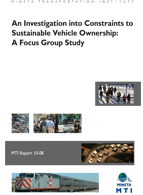- 408-924-7560
- mineta-institute@sjsu.edu
- Donate
An Investigation into Constraints to Sustainable Vehicle Ownership: A Focus Group Study
Though most Americans hold pro-environmental attitudes, an attitudes-behavior gap exists with respect to vehicle ownership. Significant constraints appear to prevent most people with environmental concerns from buying smaller, more fuel-efficient, less-polluting vehicles. But researchers have only a simplistic understanding of what those constraints are and how individuals describe and react to them. This study explored these barriers in depth through a series of focus group discussions with 36 residents of the Sacramento, California, metropolitan region who held pro-environmental attitudes.
Analysis of the focus group conversations revealed that the features of vehicles currently on the market, family and work responsibilities, residential choices, and routines and preferences all constrained participants’ vehicle purchase choices to ones which, more often than not, poorly reflect their environmental attitudes. The group conversations also revealed serious misunderstandings about the environmental impacts of owning and using vehicles that make it difficult for many to accurately assess their alternatives.
For some participants, environmental concerns are unlikely to influence future vehicle purchase decisions, even if constraints were removed altogether; other priorities have taken and will take precedence over the environmental impacts of their choices. But for many participants, strategies to remove or weaken the identified constraints to owning smaller and more fuel-efficient vehicles could lead them to choose vehicles that would reduce their resource and energy consumption for personal transportation. Further research with a larger pool of subjects is needed to confirm whether the focus group findings apply to the larger population.
BRADLEY FLAMM, PhD
Bradley Flamm is assistant professor in the Department of Community and Regional Planning at Temple University (Ambler, Pennsylvania). He teaches transportation planning, planning methods, and sustainable development courses. His research interests are focused on the environmental and energy impacts of transportation systems and on greenhouse gas (GHG) emissions and climate change action planning at the municipal level. He chairs the Transportation Sub-Committee of Temple University’s Sustainability Task Force and is co-chair of the Ambler Campus Sustainability Council. He has a B.A. from the University of California at Berkeley in Political Science, a Master of Regional Planning from Cornell University, and a PhD in City and Regional Planning from the University of California at Berkeley.
ASHA WEINSTEIN AGRAWAL, PhD
Asha Weinstein Agrawal is associate professor in the Department of Urban and Regional Planning at San José State University, and also director of MTI’s National Transportation Finance Center. Her research interests in transportation policy and planning include transportation finance, pedestrian planning, and urban street design. She also works in the area of planning and transportation history. She has a B.A. from Harvard University, an MURP from the London School of Economics and Political Science, and a PhD from the University of California at Berkeley.
-
Contact Us
San José State University One Washington Square, San Jose, CA 95192 Phone: 408-924-7560 Email: mineta-institute@sjsu.edu






